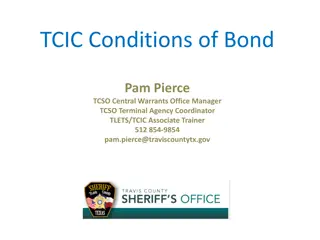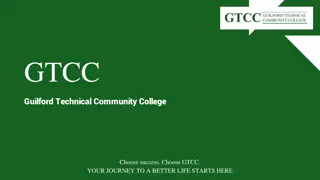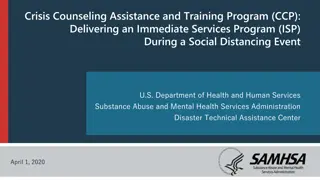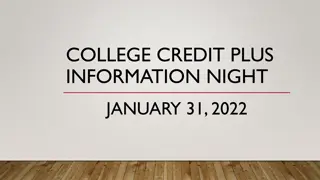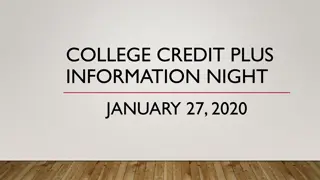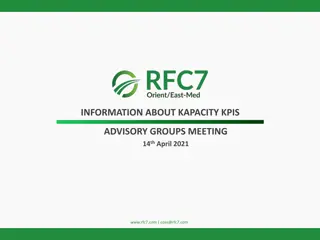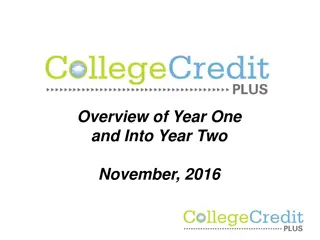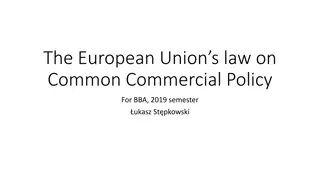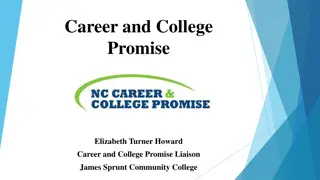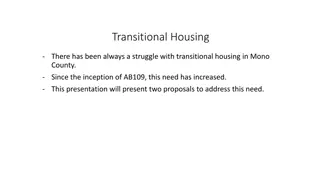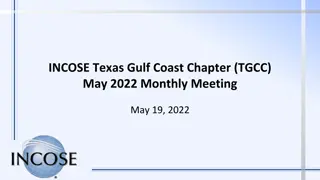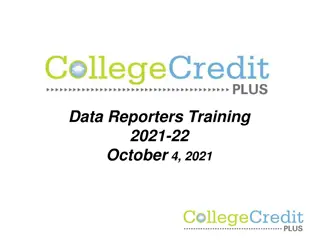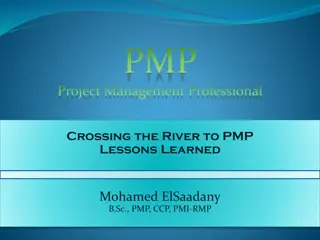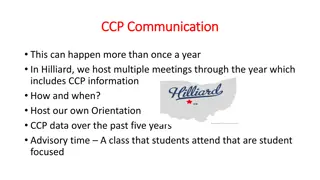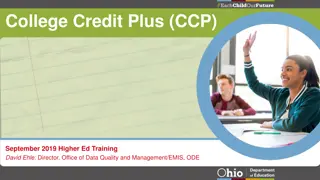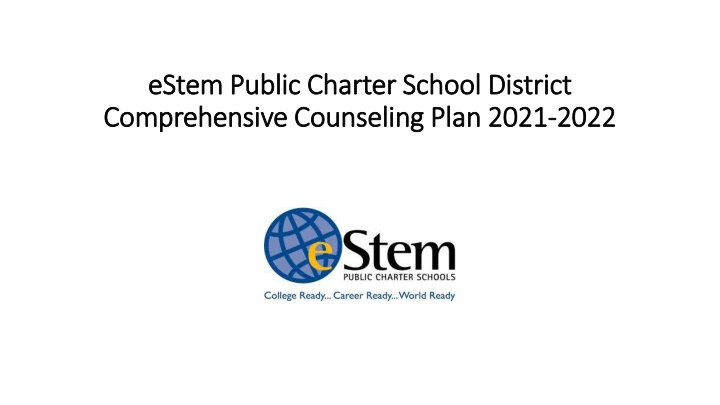
Comprehensive Counseling Plan for eStem Public Charter School District 2021-2022
This comprehensive counseling plan outlines the school counselors, campus administrators, district administrators, and counselor belief statements for the eStem Public Charter School District for the years 2021-2022. It includes contact information for school staff, emphasizing the importance of fostering academic success, social and emotional well-being, and providing support for students' needs. The plan aims to promote self-awareness, problem-solving skills, emotional management, and academic habits for future career success.
Download Presentation

Please find below an Image/Link to download the presentation.
The content on the website is provided AS IS for your information and personal use only. It may not be sold, licensed, or shared on other websites without obtaining consent from the author. If you encounter any issues during the download, it is possible that the publisher has removed the file from their server.
You are allowed to download the files provided on this website for personal or commercial use, subject to the condition that they are used lawfully. All files are the property of their respective owners.
The content on the website is provided AS IS for your information and personal use only. It may not be sold, licensed, or shared on other websites without obtaining consent from the author.
E N D
Presentation Transcript
eStem eStemPublic Charter School District Public Charter School District Comprehensive Counseling Plan Comprehensive Counseling Plan 2021 2021- -2022 2022
eStem School Counselors Name School Contact Email Contact Phone Number Ms. Gynesis Allen M. Ed School Counseling Downtown Elementary gynesis.allen@estemschools.org 501-748-9203 Ms. Tracy Richardson M. Ed School Counseling Downtown Elementary tracy.richardson@estemschools.org 501-748-9286 Mrs. Jennifer Knight M. Ed School Counseling East Village Elementary jennifer.knight@estemschools.org 501-214-6804 Ms. Hannah Gorman M. Ed School Counseling East Village Elementary hannah.gorman@estemschools.org 501-214-6803 Ms. Makenzie Martin M. Ed School Counseling Downtown Junior High makenzie.martin@estemschools.org 501-748-9343 Mrs. Lashonda Norfolk M. Ed School Counseling East Village Junior High lashonda.norfolk@estemschools.org 501-214-6704 Mrs. Kimberly Huskey M. Ed School Counseling High School kimberly.huskey@estemschools.org 501-478-2729 Ms. Sharline Laurent High School sharline.laurent@estemschools.org 501-478-2811
Campus Administrators Name School Contact Email Contact Phone Number Mrs. Melissa Hurst Downtown Elementary Director melissa.hurst@estemschools.org 501-748-9202 Mrs. Allyson Harris East Village Elementary Director allyson.harris@estemschools.org 501-214-6810 Ms. Nia Ahmad East Village Elementary Assistant Director nia-amani.ahmad@estemschools.org 501-214-6802 Mr. James Moore Downtown Junior High Director james.moore@estemschools.org 501-748-9335 Mrs. ShaVonya Berry East Village Junior High shavonya.berry@estemschools.org 501-214-6701 Mr. Maurice Guest High School Director maurice.guest@estemschools.org 501-478-2803
District Administrators and Campus Support Name Title Contact Email Contact Phone Number Dr. John Bacon CEO john.bacon@estemschools.org 501-324-9202 Dr. Cindy Barton COO cindy.barton@estemschools.org 501-503-0035 Ms. Louisa Rook M. Ed School Counseling Lead Counselor District 504 Administrator louisa.rook@estemschools.org 501-838-7199 Ms. Stacie Thompson M. Ed School Counseling SBMHC, DMEC, College and Career Transition Counselor, Alumni and College Relations Coordinator stacie.thompson@estemschools.org 501-944-7472 Mrs. Jessica Acklin District Health Coordinator jessica.acklin@estemschools.org 501-478-2808 Ms. Nicole Griffin College and Career Readiness Teacher nicole.griffin@estemschools.org 501-478-2772
Counselor Belief Statements All students have dignity and worth. All students can learn and achieve academic success when encouraged and nurtured in a respectful environment. Nurturing all students social and emotional well-being will encourage academic development and future success. All students should have access to a credentialed school counselor who advocates for their academic, career, and social/emotional needs providing a data driven, developmental counseling program through guidance curriculum, individual student planning, responsive services, and system support. The school counseling program will promote the following: an understanding and respect of self and others; problem-solving and decision-making; emotional-management skills; skills for learning; and the influence of academic habits on career success. The school counseling program is planned and coordinated by the lead counselor, school based mental health coordinator, and school counselors with input from faculty and parents, as well as an advisory council composed of school counselors, students, parents, and faculty. School counselors abide by the ASCA Ethical Standards for School Counselors to make informed decisions based on the highest moral principles. Professional development is crucial and required for school counselors to stay informed with current trends in education and mental health. 1. 2. 3. 4. 5. 6. 7. 8.
Vision Statement Mission Statement The eStem school counselors will provide a comprehensive, developmentally appropriate atmosphere of security, warmth, and encouragement as eStem students take risks, collaborate, and problem solve to reach their fullest educational potential in the areas of academic, career, and personal development while successfully managing their lives as healthy, respectful, and productive citizens. The eStem school counselors in conjunction with parents, faculty, businesses, mental health providers, community, and post secondary schools will assist all students in becoming responsible citizens and productive, lifelong learners through their academic development, personal and social growth, and career exploration, especially in the areas of engineering, science, technology, economics, math and literacy.
Districtwide Student SMART Goal Our district implemented a comprehensive anti-bullying program last year, but due to COVID protocols and many students attending school virtually, several key components were not fully implemented. In order to ensure safety and security for all students K-12 and promote inclusive behaviors, we will fully implement a comprehensive anti-bullying program for the 2021-2022 school year. Our SMART goal involves eliminating incidents of bullying by 50% at all campuses in our district. District discipline records will used to track bullying, as well as student, parent, and school surveys. This goal will be reviewed at the end of the 2021-2022 school year.
Actions in Place Deans hold town halls in each school to discuss school climate issues including recognizing and reporting bullying behaviors. Anti-bullying media is clearly displayed in the buildings throughout the district. Teachers are trained to recognize and report bullying in the classroom.
Actions to Take Teachers will be trained to recognize and deter bullying in the classrooms and common areas. Student led task forces will be trained to respond to bullying in several ways. Data Data Review: Review: Counselors will conduct surveys at the beginning, middle, and end of the school year with students, parents, and school faculty to evaluate efforts to reduce bullying in schools. An anonymous hotline/app will be established so that any stakeholder can report instances of bullying to the counselors and administration. Students who exhibit bullying behaviors will meet with counselors and outside service providers as needed. Student led, multi- grade level anti- bullying task forces will be formed at each school led by the counselors.
Student Services eSTEM Public Charter School District s Comprehensive Guidance and Counseling Program provides services in accordance with the ADE Guide for Life and the ASCA Mindsets and Behaviors for Student Success. The Guide for Life will be used as the key resource for classroom guidance lessons. A combination of direct and indirect students services are utilized in assisting students to achieve their competencies. Every student will have multiple opportunities to acquire competencies in the three domains of Academic Development, Career Development, and Personal/Social Development.
Tiers of Counseling Services Tier One- examples include whole class lessons, brief individual and small group counseling, academic and career planning support, using counseling curriculum and resources with students Tier Two- examples in place include targeted interventions for social and emotional and academic counseling Tier Three- outside referrals for services
Direct Student Services- Guidance Curriculum for Whole Class and Small Group Lessons/Individual Counseling The guidance curriculum component consists of developmental, comprehensive, and preventive lessons presented systematically to all students through classroom and group activities that address the three primary domains (academic development, career development, and personal/social growth). The curriculum lessons focus on decision-making, goal setting, peer relationships, self-awareness, career awareness, and educational and career planning. The counselor s responsibilities with direct student services include the organization and implementation of classroom guidance lessons and group guidance. The counselors and the college/career readiness teacher facilitate, co-lead, or collaborate lessons for small and large groups dealing with problem-solving, study skills, test taking skills, peer and faculty relationships, bullying, resume writing, financial aid, goal setting, college and career readiness, financial aid for secondary education and many other topics.
Direct Student Services- Classroom Guidance Activities Counselors facilitate, co-lead, or collaborate in the delivery of guidance curriculum activities at least one time per grade level, per month. DESE s Guide for Life curriculum will be utilized for these activities. These activities may be conducted in the classroom, in the guidance offices, or in other school facilities. Counselors conduct small-group counseling sessions and activities outside the classroom to respond to students identified interests or needs. Small-group counseling may be either an immediate response to a specific need or continuous throughout a period of time. Topics may include peer mediation, managing emotions, grief counseling, grade level considerations for college and career, and other social emotional learning skills. The Guide for Life essential skills will be used for whole group Tier One lessons in each grade level. https://sites.google.com/pdarkansas.net/guideforlifecurriculum/home- Guide for Life curriculum guide/lesson plans
Direct Student Services- Interdisciplinary Curriculum Development Counselors participate and consult on interdisciplinary teams to develop and refine curriculum in content areas. These teams work to develop comprehensive lesson plans to be used in core and elective classroom units and assist teachers in the delivery of the content to help students acquire, enhance, or master academic, college and career, and social/emotional/personal skills. These lessons are taught by both the counselors and our college/career readiness teacher.
Topics for Direct Services School Guidance Curriculum Activities May Include: Positive Self Image Communication Skills Positive Peer Relationships/Interactions Substance Abuse Prevention Programs Post-High School Planning Career Awareness and Exploration Study Skills Decision Making Skills Personal Safety and Hygiene Employment/Interview Skills Diversity Anger Management Bullying Suicide Prevention Sexual Abuse Prevention Managing Emotions LGBTQ+
Direct Services- Individual Counseling and Student Planning The individual counseling and student planning component consists of activities that focus on assisting individual students with developing, analyzing, and evaluating educational, career, and personal goals/plans. Individual student planning emphasizes test interpretation, while academic counseling includes postsecondary education, career/technical education, and career planning. Examples of individual student planning delivery options within this component include: Individual Appraisal: Counselors help students assess and interpret individual abilities, interests, skills, and achievements. The utilization of appropriate assessment information becomes an important aspect of individual development of immediate and long-range plans. Individual Advising: Counselors help students acquire self appraisal skills; personal and social development skills; and educational, career, and labor market information. This information assists students in planning for personal, academic, and career aspirations. Counselors recognize the critical need to enlist teachers, parents or guardians, and stakeholders in helping students make academic and career choices. Examples of activities that require individual advisement and counselor participation/implementation include student success plans, academic advising for course placement, scholarship applications, reference letters, and college selection. Individual Proactive and Responsive Counseling: Counselors advise students in proactive situations by helping students identify potential problems, causes, potential consequences and benefits, alternatives, and outcomes leading to informed decision making. Responsive counseling services include supporting students during and after a crisis occurs--including directing students and parents to long term support professionals and community resources.
Topics for Direct Services- Individual Proactive and Responsive Counseling Topics for individual proactive student Naviance Student Updates in Junior High and High School planning activities include: Topics for individual responsive counseling: Grief Counseling Career Awareness and Exploration Traumatic Event Counseling Career/Technical Education Programs Suicidal Ideation and Prevention School Visits for Transitioning Students Emotional Distress LGBTQ+ Career Shadowing Relationship Counseling Postsecondary Application Process Emotional regulation Four-Year Educational Plans Student portfolios Honors and Awards Programs Financial Aid/Scholarship Advising
Topics for Direct Services- Individual Proactive and Responsive Counseling Additionally, eStem counselors may coordinate, facilitate, and/or conduct the following activities with students on an individual basis as needed: Educational Placement of Students Providing Student Records to Colleges/Jobs/Government College Selection and Admission Assistance Program Planning (parents and students) Financial Aid Assistance Interpreting Test Results Scholarship Application Assistance Career Fairs Educational and Career Plans (including a four/six Common App year plan that covers graduation requirements) Personal and Social Issues Affecting School and Future Plans Career Interest Inventories Student Records Review Transcript Reviews School Schedule Adjustments
Direct Services- Orientation Programs for New and Transitioning Students Building counselors advise students in making transitions between schools by providing information and by assisting in the access of resources. New student orientation events are held each year in the spring for students transitioning between buildings in our district. Tours of the building are provided throughout the year for potential students. Students transitioning between high school and college/career beyond the district have a transition counselor available for one on one advisement.
Direct Services- At Risk Students/Dropout Prevention/Graduate Follow-up Building counselors are members of the RTI team in each of their buildings and provide resources for students and their parents after students are referred for extra services by teachers. High school counselors review grades each quarter for students in danger of failing and meet with them weekly to discuss academic improvement and extra services. Seniors must remain in the building after the senior release day if their course work is not completed for graduation. Counselors meet with students for one on one meetings to discuss progress towards graduation. The Keystone School is used to help students regain lost credits needed for graduations. The college and career transition counselor visits one on one with each graduate in the first two years after they graduate from high school.
Indirect Student Services- Consultation: School counselors serve as student advocates by consulting with students, parents or guardians, educators, and community agencies regarding strategies to help students and families. Advocacy may include participation in student management teams regarding student academic programs, students with special needs, and students with mental health needs.
Indirect Services- Referrals eStem Public Charter Schools counselors strive to include activities that meet the immediate needs and concerns of individual students whether those concerns involve individual or group counseling, information dissemination, crisis intervention, consultation or referral. The counselor assists in the identification of at-risk and special needs students who qualify for specific interventions. At-risk students are identified by evaluating their academic record, discipline referrals, attendance, faculty recommendations, and state assessment data. Counselors should assist with the interpretation of assessments given at their respective schools used for placement of at-risk students into special programs. These tests include: NWEA, PSAT, ACT, SAT, ASVAB, ACT Aspire, Classroom Formative and Summative Assessments (with anecdotal teacher notes). Counselors assist students with problem solving, agency referral, collaboration, and consultation. When cases are identified that require outside, emergency, long-term, and/or intensive treatment, the counselors work closely with the school nurses, the school resource officers, local mental health providers, community services, and DHS. Some of the local agencies that are used for student referrals include Arkansas Behavioral Health Services, Arkansas Children s Hospital, DHS, Life Strategies, the Pat Center, UAMS Strive Little Rock Police Department, Little Rock Fire Department, different primary care physicians at local medical facilities, University of Arkansas Criminal Justice Institute, Arkansas Food Bank.
Indirect Services- Referrals Counselors use referral sources to complement and reinforce services provided through the school counseling and guidance program. These referral sources for students and families may include, but are not restricted to: School Based Mental Health Agencies State Service Agencies for Children and Families Accelerated High School Programs Social Services Grief Counseling Deployment/Military Resources Family Services Pulaski County Community Resources Guide (Appendix A) Central Arkansas Community Resource Guide (Appendix B)
Decision Making Teams Counselors participate in decision making teams. This includes indirect guidance management and collaboration activities that ultimately maintain and enhance the total counseling and guidance program for students and families. Responsibilities in this area include staff relations, community relations, professional development, student support teams, test interpretation, data analysis, state committees, and counseling curriculum development. This component provides support to eStem Public Charter Schools academic programs, as well. Examples of system support and collaboration delivery options within this component include:
Professional Development/In-Service Counselors update professional knowledge and skills each year according to the Arkansas Department of Education rules regarding professional development. This may involve participating in regular school in-service training, attending professional meetings, completing postgraduate course work, or contributing to work done by state agencies and committees. Counselors attend system and school in-service training to ensure counseling skills are updated in the areas of counseling curriculum development, technology, and data analysis. Counselors may provide in-service instruction in school guidance curriculum and areas of special concern to the school and community. Trauma Informed Training Anti-Bullying Training/Bystander Training Suicide Awareness and Prevention Training
Consultation, Collaboration, and Teaming: Counselors provide important contributions to the school system by consulting, partnering, and collaborating with various community/school stakeholders. Counselors consult regularly with teachers and professional staff members in order to receive feedback on emerging needs of students and to provide information and support to staff.
Parent Workshops, Public Relations, and Community Outreach Counselors facilitate or organize informational sessions about student developmental needs for each age group and design activities to orient the staff, community, and parents about the comprehensive school counseling and guidance program. Counselors forge partnerships with local businesses, industries, and social service agencies. Community outreach requires counselors to be knowledgeable about community resources, employment opportunities, and local labor market information.
Program Management and Operations--Research, Evaluation, and Reflection Planning and management tasks include the support of activities conducted in the school counseling and guidance program and responsibilities expected of a member of the school staff. Taking an active role in forming and supporting counseling policies and procedures and research/resource development are elements of management activities. Some examples of counselor research and evaluation include eStem Public Charter Schools counselor evaluations by administrators, other personnel guidance evaluations, program evaluations, data analysis, follow-up studies, professional development, updating of resources, and counseling staff reflections on best practices for future reference. Examples of areas where counselors consult, collaborate, and team: LPAC Committee Member RTI Team Member School Improvement Plan Committee Member 504 Committee Member IEP Team Member LEA Representative for State/Community Group Special Projects Team Member Community Liaison with Colleges Community Liaison with Volunteer Agencies Graduation Committee
Program Management and Operations--Research, Evaluation, and Reflection: The counselors conduct classroom guidance assessments and utilize data to analyze its impact and guide further community and stakeholder partnerships. They collaborate with teachers in determining the factors that are impeding the success of students and conduct follow-up interventions. Partnerships are formed after evaluating student academic records, discipline referrals, attendance, state assessment data, student social and emotional needs, and student personal needs. Guidance counselors in eStem Public Charter Schools are involved with many community/state agencies and programs. Some of those agencies and programs include but are not limited to: Arkansas Department of Human Services Our House Shelter Red Cross Relay for Life University of Arkansas Criminal Justice Institute Rotary Club Life Strategies UAMS STRIVE Little Rock Police Department Pulaski County Juvenile Court Little Rock Fire Department Arkansas Department of Education School Based Mental Health Office Arkansas Food Bank
Members and Collaborators in State Agencies and Associations When funding is made available, the counselors continue professional growth by attending seminars, workshops, in-services, and completing classes to maintain their certifications with the Arkansas Department of Education. All eStem counselors hold membership in the Arkansas School Counseling Association and the American School Counselor Association.
Administrative/Fair Share Activities Fair-share responsibilities may include such tasks as hall duty, lunch duty, playground duty, and class/club sponsorship, conduct tests, attend Open House and other night programs, and assist with fire/tornado drill administration. Non- guidance responsibilities assigned to counselors should not be above and beyond those of other certified staff members, and should not interfere with the delivery of guidance services. Administrative activities/fair share responsibilities are not directly related to the comprehensive school counseling program and are absent of any direct or indirect student services or interaction.
Administrative/Fair Share Activities Name School Downtown Elementary Downtown Elementary East Village Elementary East Village Elementary Downtown Junior High East Village Junior High Administrative/Fair Share Duties Ms. Gynesis Allen Ms. Gynesis Allen M. Ed School Counseling M. Ed School Counseling Ms. Ms. Tracy Tracy Richardson Richardson M. Ed School Counseling M. Ed School Counseling Mrs. Jennifer Knight Mrs. Jennifer Knight M. Ed School Counseling M. Ed School Counseling Ms. Hannah Gorman Ms. Hannah Gorman M. Ed School Counseling M. Ed School Counseling Ms. Mackenzie Martin Ms. Mackenzie Martin M. Ed School Counseling M. Ed School Counseling Mrs. Lashonda Norfolk Mrs. Lashonda Norfolk M. Ed School Counseling M. Ed School Counseling Help with tornado drills, help with fire drills, help with testing administration Help with tornado drills, help with fire drills, help with testing administration Help with tornado drills, help with fire drills, member of the school leadership team, help with testing administration Help with tornado drills, help with fire drills, member of the school leadership team, help with testing administration Help with tornado drills, help with fire drills, member of the leadership team, help with testing administration Help with tornado drills, help with fire drills, member of the leadership team, help with testing administration Mrs. Kimberly Huskey Mrs. Kimberly Huskey M. Ed School Counseling M. Ed School Counseling Ms. Sharline Laurent Ms. Sharline Laurent High School Help with tornado drills, help with fire drills, help with concurrent credit enrollment, help with testing administration Help with tornado drills, help with fire drills, help with concurrent credit enrollment, help with testing administration High School
Annual Counseling Calendars Annual Calendar at a Glance Annual Calendar at a Glance eStem Downtown Elementary and eStem East Village Elementary eStem Downtown Elementary and eStem East Village Elementary August August January Orientation Orientation Anti Anti- -Bullying Task Force Bullying Task Force- - creation/implementation creation/implementation GUIDE to Life GUIDE to Life- - Decisions Decisions- - class lesson class lesson Participate in 504 annual reviews Participate in 504 annual reviews September September GUIDE to Life GUIDE to Life- - Decisions Decisions- -class lesson class lesson Meetings with students at risk of failing Meetings with students at risk of failing GUIDE to Life- Empathy--class lesson February GUIDE to Life- Growth-class lesson Meetings with students at risk of failing October October class lesson March GUIDE to Life GUIDE to Life- - Understanding Understanding- -class lesson Fall Career Fair Fall Career Fair- -one day one day Meetings with students at risk of failing Meetings with students at risk of failing GUIDE to Life- Growth-class lesson Spring Career Fair- one day Meetings with students at risk of failing November November class lesson April GUIDE to Life GUIDE to Life- - Understanding Understanding- -class lesson Anti Anti- -bullying Week bullying Week Meetings with students at risk of failing Meetings with students at risk of failing GUIDE to Life-Interaction-class lesson Meetings with students at risk of failing December December class lesson May GUIDE to Life GUIDE to Life- - Empathy Meetings with students at risk of failing Meetings with students at risk of failing Empathy- -class lesson GUIDE to Life-Interaction-class lesson Mental Health Awareness Week Meetings with students at risk of failing
Annual Calendar at a Glance Annual Calendar at a Glance eStem Downtown Junior High and eStem East Village Junior High eStem Downtown Junior High and eStem East Village Junior High August August January Orientation Orientation Anti Anti- -Bullying Task Force Bullying Task Force- - creation/implementation creation/implementation GUIDE to Life GUIDE to Life- - Intro Intro to the Counseling Department to the Counseling Department Participate in 504 annual reviews Participate in 504 annual reviews GUIDE to Life- Interaction-class lesson Scheduling- Assist students in selecting classes for next year Update Naviance (8th and 9th Grades) September September February GUIDE to Life GUIDE to Life- - Growth Naviance Student Updates Naviance Student Updates College Admissions Speakers College Admissions Speakers Meetings with students at risk of failing Meetings with students at risk of failing Update Naviance (8 Update Naviance (8th th and 9 Growth class lesson class lesson GUIDE to Life- Decisions-class lesson Scheduling- Assist students in selecting classes for n Meetings with students at risk of failing ext year Update Naviance (8th and 9th Grades) March Spring Career Fair- one day Meetings with students at risk of failing Update Naviance (8th and 9th Grades) and 9th th Grades) Grades) October October GUIDE to Life GUIDE to Life- - Understanding class lesson Understanding class lesson Fall Career Fair Fall Career Fair- - one day one day Meetings with students at risk of failing Meetings with students at risk of failing Update Naviance (8 Update Naviance (8th th and 9 and 9th th Grades) Grades) November November class lesson lesson April GUIDE to Life GUIDE to Life- - Understanding Understanding- -class Anti Anti- -bullying week bullying week Meetings with students at risk of failing Meetings with students at risk of failing Update Naviance (8 Update Naviance (8th th and 9 GUIDE to Life-Empathy-class lesson Meetings with students at risk of failing Update Naviance (8th and 9th Grades) and 9th th Grades) Grades) December December class lesson lesson May GUIDE to Life GUIDE to Life- - Understanding Understanding- -class Meetings with students at risk of failing Meetings with students at risk of failing Update Naviance (8 Update Naviance (8th th and 9 GUIDE to Life-counselor s choice-class lesson Mental Health Awareness Week Student Success Plans (8th grade) Summer School Planning Meetings with students at risk of failing Update Naviance (8th and 9th Grades) and 9th th Grades) Grades)
Annual Calendar at a Glance eStem High School August January Orientation Anti-Bullying Task Force- creation/implementation GUIDE to Life- Decisions-class lesson FAFSA Assistance Common App Assistance Naviance Student Updates Participate in 504 annual reviews Saturday College Admissions Help Sessions College Admissions Speakers GUIDE to Life- Empathy-class lesson Naviance Student Updates Saturday College Admissions Help Sessions Scheduling- Assist students in selecting classes for next year September February GUIDE to Life- Decisions-class lesson Naviance Student Updates Saturday College Admissions Help Sessions College Admissions Speakers Meetings with students at risk of failing GUIDE to Life- Growth-class lesson Naviance Student Updates Saturday College Admissions Help Sessions Scheduling- Assist students in selecting classes for next year Meetings with students at risk of failing School Counselor Advisory Council Meeting October March GUIDE to Life- Understanding-class lesson Naviance Student Updates Saturday College Admissions Help Sessions College Admissions Speakers Fall Career Fair- one day Meetings with students at risk of failing School Counselor Advisory Council Meeting GUIDE to Life- Growth- in class lesson Naviance Student Updates Saturday College Admissions Help Sessions Spring Career Fair- one day Meetings with students at risk of failing November April GUIDE to Life- Understanding-class lesson Naviance Student Updates Saturday College Admissions Help Sessions Anti-bullying Week College Admissions Speakers Meetings with students at risk of failing GUIDE to Life-Interaction-class lesson Naviance Student Updates Saturday College Admissions Help Sessions Meetings with students at risk of failing School Counselor Advisory Council Meeting December May GUIDE to Life- Empathy-class lesson Naviance Student Updates Saturday College Admissions Help Sessions Meetings with students at risk of failing GUIDE to Life-Interaction-class lesson Naviance Student Updates Mental Health Awareness Week Saturday College Admissions Help Sessions Meetings with students at risk of failing Summer School Planning Graduation Planning
Career Planning The counselors will plan career fairs at each level (elementary, junior high, and high school) in the fall and spring. During their monthly GUIDE to Life classroom visits, counselors will discuss careers as they fit into the curriculum. Career exploration is infused into the high school Saturday college admissions help sessions. Naviance also includes career planning activities, and is used throughout junior high and high school. Guest speakers are invited to each campus to talk about their career experiences. Career Planning Tools: U. S. Department of Labor sponsored Career One Stop https://www.careeronestop.org/ExploreCareers/Assessments/interests.aspx U. S. Department of Labor sponsored O*Net https://www.onetonline.org/ College Board Career Finder https://roadtripnation.com/edu/careerfinder Arkansas Workforce Centers https://www.arjoblink.arkansas.gov/ada/r/
Procedures for Those at Risk of Dropping Out Counselors participate in RTI teams at all grade levels to offer support for students who are struggling academically. The high school counselors meet directly with students who are at risk of failing or dropping out and their parents. Counselors utilize the questionnaire linked below to guide students in the understanding of outcomes regarding staying in school or choosing to leave. The counselors closely monitor these students grades throughout the school year and continue close contact throughout the time the students are identified as at risk of failing or dropping out. Transcripts are checked each year to make sure that students are making sufficient progress for graduation. Students who are not on track to graduate on time and plan on continuing high school either complete make-up credits through summer school or The Keystone School Credit Recovery System. Students progress towards graduation is monitored each year.
Assessing The Program Assessment Tools Building Counselor Appraisals SCUTA Use of Time sheets monthly Parent, Student, Faculty, Community Partner Surveys: Smart Goal Overall Counselor Program Counselor Reflections TESS Evaluations Responsible Party Ms. Rook Building School Counselors Due Date May 2022 June 2022 Ms. Rook May 2022 Building School Counselors Building School Counselors May 2022 June 2022
Data Sharing Plan Sharing smart goal data via social media Sharing the comprehensive counseling plan on the school website Sharing School District Information on counselors during National School Counselor Week Sharing information regarding mental health during Mental Health Awareness Month
Comprehensive School Counseling Self-Assessment School Counselor Advisory Council Annual Administrator Conference School/District Advisory Committees: Counselors form counseling and guidance advisory committees at both the district and the individual school level. Counselors actively serve on community/state committees or advisory councils that influence others to generate support for eStem Public Charter Schools counseling and guidance programs. Counselors participate in the ongoing review and revision of academic curriculum materials as related to test data and analysis, student advocacy, student safety protocols, student mental health awareness, postsecondary education choices, and career/technical education planning. District Level School Counselor Advisory Council Meetings August 2021- Professional Development October 2021 Professional Development January 2022 Professional Development April 2022 Professional Development May 2022 Annual Administrator Conference

